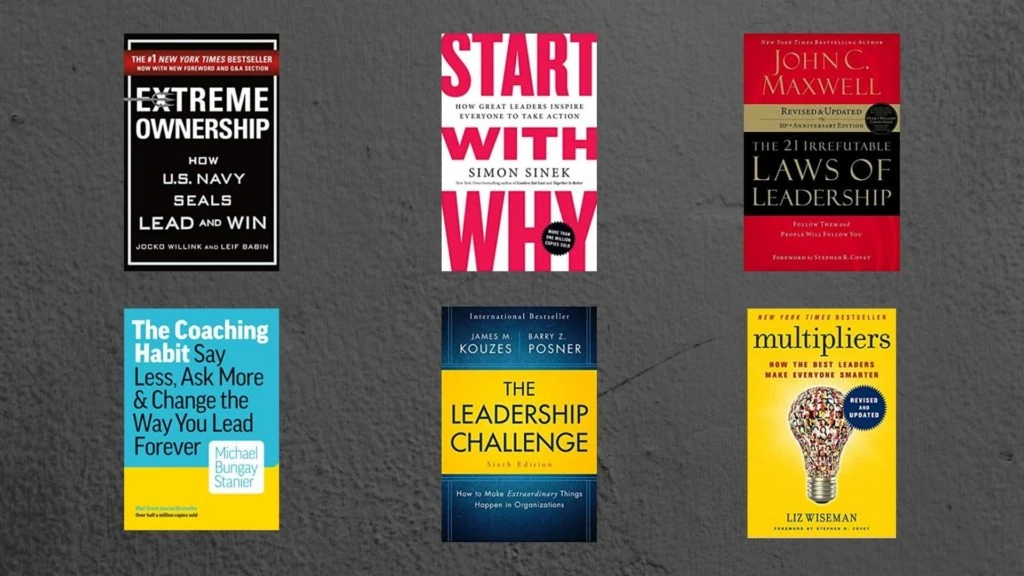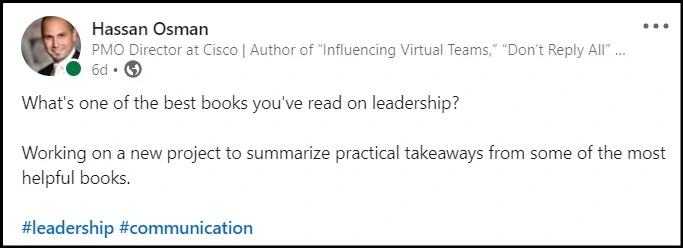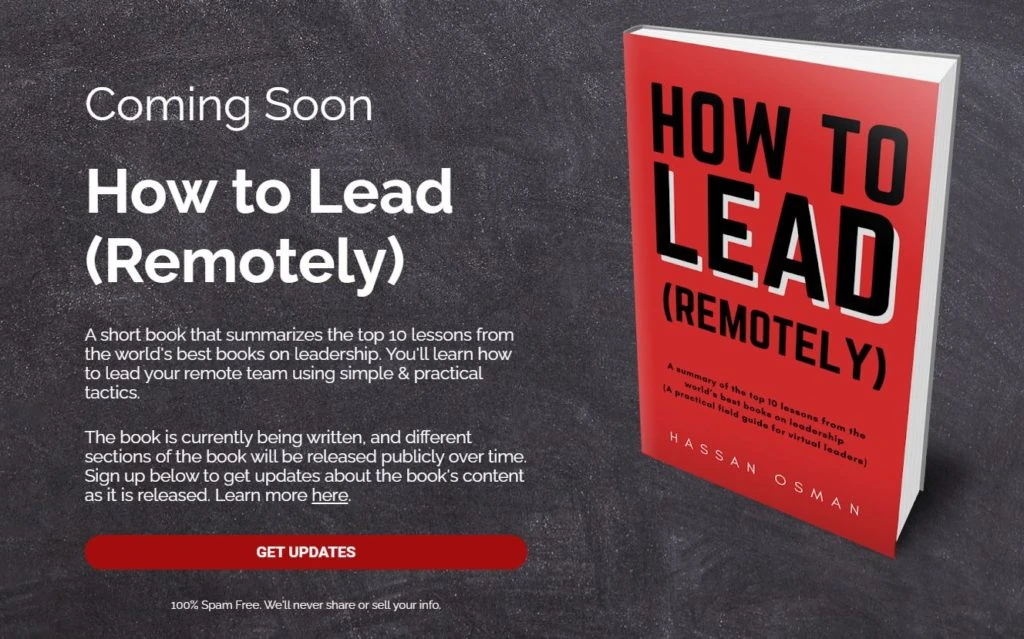
This is my first post about writing a new book on the topic of remote leadership, and here are my initial thoughts about how I plan on approaching the process of writing and researching it.
A couple of quick notes before we start.
First, a reminder that if you’d like to follow along and get updates about the book via email, click here.
Second, I might be updating this page over time because my method and approach could change. That’s because I am relying on the patterns & findings to guide me on how the book will shape up. I might also adjust my methods if they become too cumbersome. So nothing here is set in stone.
Finally, keep in mind that I’m not a “researcher” per se. I don’t have a Ph.D., and I’m not trained in the areas of statistical research. So I’m approaching this project with more of an observational lens than a scientific one.
With that, let’s get started.
What am I Going to Research?
The first question is, what exactly am I going to research?
The challenge is that leadership is such a broad and popular topic. There are over 5.2 Billion search results on Google and over 60,000 book search results on Amazon about the keyword “leadership.”
This is not surprising. Leadership skills are always in demand, and there seems to be a continuous thirst for the subject around the world.
So this is going to be a huge challenge.
However, I do have a general idea about the four content categories I’ll focus on:
- Books (e.g., Top 20 bestselling books)
- Articles (e.g., Harvard Business Review articles)
- Lectures (e.g., TED videos)
- Thought leader surveys (e.g., Responses from practitioners & academics)
Out of all those categories, I will start with books.
That’s because books are practical, are widely consumed, and have been around the longest as a medium. Books also have several success metrics that I can track (e.g., bestseller lists, number of average reviews, etc.), and they’re extensively summarized and cited.
After I read a few books and come up with some common themes, I’ll then start exploring articles, lectures, and surveys (more to come about those later).
What Books Will I Select?
Selecting the right books is another challenge because there are so many ways of analyzing this.
Should I start with bestseller lists? If so, which ones? The Wall Street Journal? New York Times?
And then there’s the timing factor. Should I start with the most recent bestsellers? Or with the older, classic ones?
I also thought about sorting books based on the average number of Amazon reviews and then start with those on top of that list. This is a potential “crowdsourcing” hack that indicates popular books based on readership.
There is also the issue of what is considered a leadership book. Would books that are focused on management (and not necessarily pure leadership) qualify? What about biographies of leaders?
So many questions.
To start somewhere, I decided to ask my friends and followers, including my connections on social media and people who signed up to my email lists, what they would recommend.
Here’s a sample question I asked on LinkedIn

I then entered all the responses into a spreadsheet and looked up the book titles on Amazon. I added the number of reviews and listed whether or the word “leadership,” (or similar keywords such as “leader,” “lead” or “leading,” etc.) appeared anywhere in the title.
I then tallied up the recommendations to find out if there were a few common books that were mentioned repeatedly.
Here are some of the top results.

Given that those books happened to be bestsellers, highly reviewed, and had a “leadership” keyword in them, I thought I’ll just start with this list.
Of course, there will be more books that I’ll read going forward as well.
Side note: Recently, there have been a lot of books that popped up that focus on the topic of Remote and Virtual Leadership. This surge in books is primarily due to COVID. Even though many of those books are not bestsellers, and some of them barely have any reviews, it would be a mistake not at least consider some of them in my research, so I’m sure I’ll be analyzing a few of those later as well.
How Will I Read & Research the Books?
Given that I don’t have a ton of free time, I need to be smart about how to approach reading and researching those books.
I’m probably not going to be able to read every single page of every single book, so here are my thoughts about how I’m going to do this.
I plan to:
- Download each book on my Amazon Kindle (Kindle books are my preferred format because I can easily highlight takeaways)
- Review the table of contents for structure and high-level themes
- Read the books, starting with a quick skim through the headings & subheadings, and then deep-diving on areas that sound interesting
- Read Amazon reviews (focusing on the most helpful positive and critical reviews)
- Read through all the popular highlights from readers (a Kindle feature)
- Read through blog posts or articles that summarized the main takeaways of the book
Those steps are not in chronological order (I might skip around) and I will probably not follow every step with every book.
What Will I be Looking For?
As I highlight notes from each book, I’ll be focusing on tidbits that meet the following criteria:
Practical Takeaways
I’ll look for specific tactics that leaders can implement. I’ll avoid high-level strategies and inspirational stories. Although those can be helpful, I’m more interested in action vs. philosophy.
Cross-functional Tips
I’ll also focus on takeaways that are industry and domain agnostic. In other words, I’ll look for lessons that can apply cross-functionally across multiple fields and orgnizations. For example, if a tip applies primarily to military leadership, then I probably wouldn’t include that as a takeaway.
Remote-Specific Tactics
I’m also going to be looking for tips and tactics that can be applied in a remote setting. Admittedly, this might be a weak filter, because I’m expecting a lot of the tips to meet this requirement. However, I’m keeping this in for now because I do want the book to be focused on helping virtual leaders.
What Will I Document?
After I highlight the takeaways from each book, I will be publishing my findings as separate posts on this blog, and I will include the following:
1. Summary
I’ll include a quick summary of the book. This will be a synopsis of the main theme of the book and what its central point is.
2. Top Takeaways
I’ll also cover the main takeaways from the book. Those will be the anecdotes and lessons that I find interesting and meet the criteria above. Those will also be the main anecdotes and tips that will probably end in my book.
3. Theme “Buckets”
Another thing I’ll document will be the main theme buckets of what the book focuses on. This analysis will be used to start prioritizing takeaways across different books. For example, if I read ten books and seven discuss the importance of “leading by example,” then this theme will probably rank higher in my book. However, I’m still unsure exactly what I’ll do with this information or how I’ll analyze it, so I’ll probably start documenting this behind the scenes in the early stages.
4. Notable Reviews and Popular Highlights
Finally, I’ll also include some snippets from helpful reviews and any popular highlights from the book (“popular highlights” is a unique feature in Kindle books that basically shows you the most highlighted sentences that readers have selected). I’m a strong believer in the power of crowdsourcing information that readers found helpful and will use that in my analysis as well.
And that’s pretty much it!
As I mentioned earlier, I might be modifying my approach depending on how things go.
What Book Will I Start With?
The first book I’ll start reading is “Multipliers: How the Best Leaders Make Everyone Smarter” by Liz Wiseman and Greg McKeown. I already downloaded it a few days ago and I’m going through it (it’s great so far!).
If you’d like to get notified when I publish the summary of the book, make sure you sign up to get updates by clicking here.

